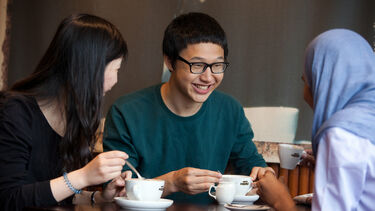Flexibility makes the course dynamic

Why did you decide to study at the University of Sheffield?
I decided to study at the University of Sheffield for a number of reasons. The Department of Politics and International Relations is one of the best in the country, the Students' Union has consistently been voted number 1, and the city itself seemed like somewhere I’d enjoy living.
Sheffield is close is to my home town, but more importantly, not too close, and it had a great mixture of 'city life' and green space. The city centre is small and compact too, which is great for being able to get everywhere quickly, and the nightlife was also appealing.
What was the best or most useful thing about the course you studied in the Department of Politics and International Relations?
I enjoyed the freedom we had to focus on our own interests. I was able to study abroad in Hong Kong and could, therefore, study Asian and geopolitics in greater detail. The academics in the Department are also some of the best in the country; it was great to know the people teaching were setting the agenda in their field.
During my time at Sheffield, I was also able to pursue work experience opportunities. I was able to work in London during my final year, and put my time on the train to good use by reading and preparing for essays! The work experience I had has been invaluable and I don’t think other departments would have been so flexible and helpful. I think flexibility makes the course dynamic, and I think that’s important when there’s so much competition for jobs after graduation.
What is your fondest memory from your time in Sheffield?
My fondest memory is definitely Freshers' Week. Everything was new and exciting, and I was lucky to make some amazing friends in my first year flat that I’m still close to now, and hopefully will be for a while!
What has your career path been since graduation?
I worked for an MP in my final year of university so spent a lot of time in London, which was a ten-month internship that finished at the same time I graduated. I then started working as an Account Executive at a government relations/public affairs company in Westminster, where I worked on a number of accounts across education and healthcare.
After a few months, I spotted another job back in Parliament. I didn’t want to leave the public affairs company so soon after starting but I couldn’t pass up the opportunity of working in Parliament again. I’ve now been working for Vernon Coaker, the Shadow Defence Secretary, for ten months and look forward to the next few months with the build-up to the General Election.
My role is quite varied. MPs usually only have one or two members of staff in their Westminster office, so it means there is quite a range of responsibilities. I spend a lot of time carrying out research and attending meetings with stakeholders in the defence industry, as well as arranging the diary and going on-site visits.
What piece of advice would you offer to new students to the Department of Politics and International Relations?
I think the most important thing for first-year students is to have as much fun as possible, make friends to enjoy the new city. I think if you have fun in the first year, you’re in a better place to work hard in the second and third year. In second and third year I’d recommend meeting as many people as you possibly can who work in the area you’re interested in, whether it’s the charity sector, diplomacy, public affairs or a political party.
If the University holds an event and gets external speakers to come along to discuss a topic you’re remotely interested in, go to the event! Try to do some brief Google research on the speaker and introduce yourself when you get a moment in the end.
It’s such a cliché but so many job opportunities arise from just talking to people, and these people often do want to help where they can, whether it’s introducing you to someone else, offering work experience or just providing advice on good things for you to do to progress in that area.

International undergraduate scholarships
We offer a generous package of financial support for international undergraduate students, including scholarships worth £10,000 towards the annual tuition fee.
Applications are open for existing offer holders for an undergraduate degree programme starting in autumn 2025.
